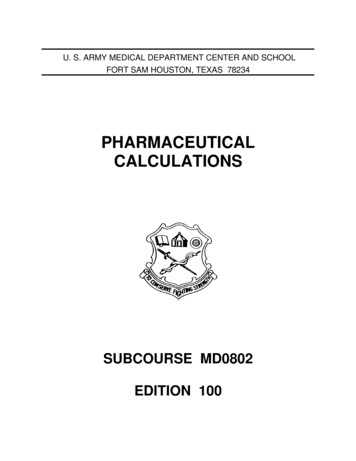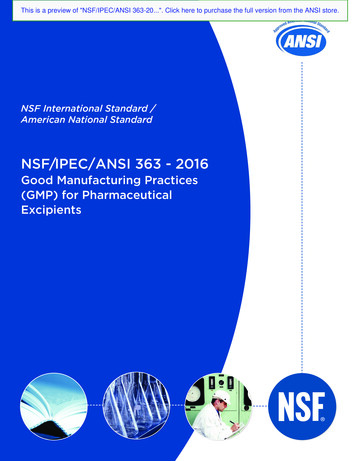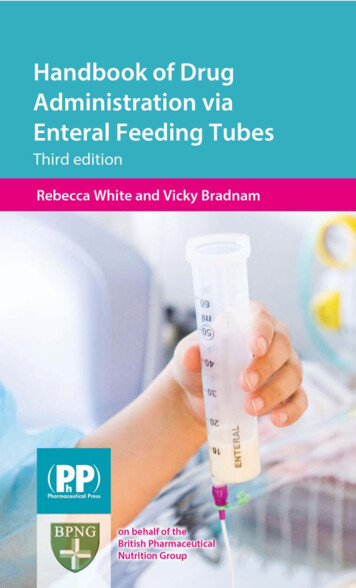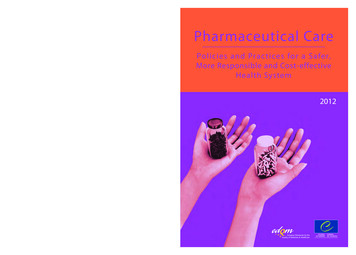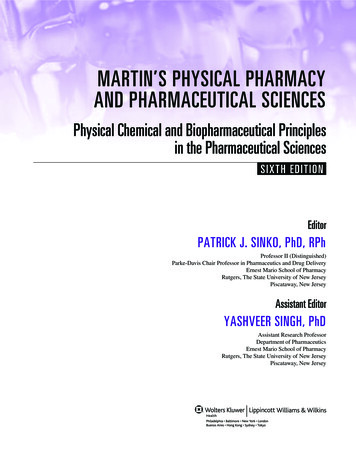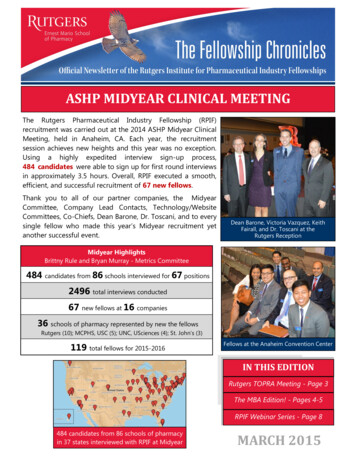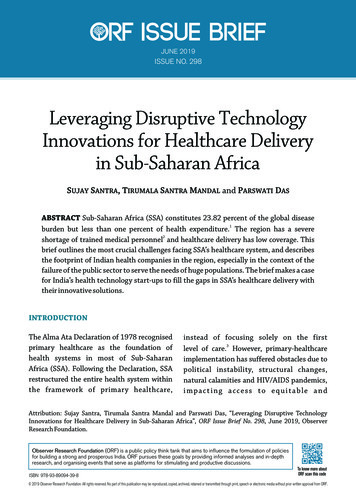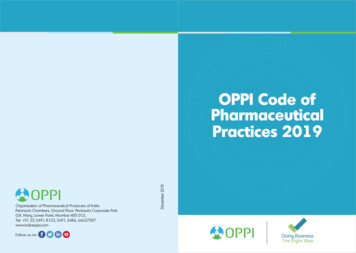
Transcription
Organisation of Pharmaceutical Producers of IndiaPeninsula Chambers, Ground Floor, Peninsula Corporate ParkG.K. Marg, Lower Parel, Mumbai 400 013,Tel: 91 22 2491 8123, 2491 2486, 66627007www.indiaoppi.comFollow us on:December 2018OPPI Code ofPharmaceuticalPractices 2019
OPPI Code of Pharmaceutical PracticesOPPI Ethos, Introduction and Preamble1.Scope and Definitions112.Basis of Interactions133.Pre-Approval Communications and Off-label use144.Standards of Promotional Information155.Printed Promotional Material166.Electronic Materials, including Audiovisuals177.Interactions with Healthcare Professionals188.Samples259.Clinical Research and Transparency10. Support for Continuing Medical Education252611. Company Procedures and Responsibilities2712. Infringement, Complaints, and Enforcement2813. Interactions with Patients Organizations28Appendix 130OPPI Code of Pharmaceutical Practices Operating ProcedureAppendix 238OPPI Secretariat Standard Operating ProceduresAppendix 344OPPI Procedural Requirements02
OPPI ETHOSMembers of the Organisation of Pharmaceutical Producers of India(OPPI) are involved in the discovery of new medicines and vaccines forpresent and future generations and provide the latest scientific andeducational content in order to benefit patients and support highquality patient care. Pharmaceutical companies discover, develop,promote, sell and distribute their products in an ethical manner and inaccordance with all the rules and regulations for medicines andhealthcare.The Ethos sets out the foundation to inform the 2019 OPPI Code ofPractice which applies to the conduct of OPPI member companies andanyone acting on their behalf. The overarching values of trust, care,fairness, respect and honesty guide their actions. This set of core valuesand principles helps ensure that their interactions with healthcareprofessionals and the broader health community are appropriate andin line with ever-changing society's expectations. The Ethos is thebaseline from which OPPI members work: It underpins the rules andprovides a framework to behave with integrity no matter how testingthe nnovationQualityTRUSTRespectHonestySpeaking UpTransparencyPrivacyEducationTRUSTAct with integrity and honesty to improve patient careand build trust with thosewe serve and to respect the independence ofhealthcare providers, patients and other stakeholders.0102
CARE:FAIRNESS:Protect the safety of those who use our products-from the conduct ofclinical trials and throughout the product life cycle.Support and respect fair trade practices and open competition. INTEGRITY: INNOVATION:Improve global health through innovative products andservices, upholding the highest ethical, scientific, and medicalstandards.Act responsibly, ethically and professionally. Do not offer,promise, provide, or accept anything of value in order toinappropriately influence a decision, gain an unfair advantage. ACCOUNTABILITY: QUALITY:Commit to providing high-quality products that have provenclinical efficacy and have a reliable safety profile.03Be accountable for our actions and decisions, including theappropriate oversight of external third parties that act on ourbehalf.04
RESPECT:Respect all people and embrace a culture of diversity and inclusion.Protect the environment . Treat animals under our care responsibly. PRIVACY:Respect privacy rights and appropriately manage and protectpersonal information. EDUCATION:Support the advancement of the scientific and medicaleducation for the ultimate benefit of patients.05HONESTY:Ensure truthful and balanced communication with governmentalauthorities, healthcare professionals, patients and other stakeholders. SPEAKING UP:Foster a culture in our respective organizations where concernsare shared openly and honestly so that we learn from mistakesand continuously improve. TRANSPARENCY:Advance science and patient care by sharing industrysponsored clinical trial data in a responsible, accurate andappropriate manner.06
INTRODUCTIONINTRODUCTIONSince the OPPI Code of Pharmaceutical Practices is based on theInternational Federation of Pharmaceutical Manufacturers andAssociations (IFPMA) Code, we provide brief introduction to the IFPMACode.IFPMA Guiding Principles on Ethical Conduct and PromotionThe following Guiding Principles set out basic standards to inform the2012 IFPMA Code of Practice which applies to the conduct of IFPMAMember Companies and their agents. This helps ensure that theirinteractions with stakeholders are appropriate.The healthcare and well-being of patients are the first priority forpharmaceutical companies.1.2.Pharmaceutical companies will conform to high standards ofquality, safety and efficacy as determined by regulatoryauthorities.Pharmaceutical companies' interactions with stakeholders mustat all times be ethical, appropriate and professional. Nothingshould be offered or provided by a company in a manner or onconditions that would have an inappropriate influence.3.Pharmaceutical companies are responsible for providingaccurate, balanced, and scientifically valid data on products.4.Promotion must be ethical, accurate, balanced and must not bemisleading. Information in promotional materials must supportproper assessment of the risks and benefits of the product and itsappropriate use.075.Pharmaceutical companies will respect the privacy and personalinformation of patients.6.All clinical trials and scientific research sponsored or supported bycompanies will be conducted with the intent to developknowledge that will benefit patients and advance science andmedicine. Pharmaceutical companies are committed to thetransparency of industry sponsored clinical trials in patients.7.Pharmaceutical companies should adhere to both the spirit andthe letter of applicable industry codes. To achieve this,pharmaceutical companies will ensure that all relevant personnelare appropriately trained.OPPI is a signatory to the IFPMA Code and hence it is obligatory on theMember Companies to adhere to the principles enshrined in thisCode. As suggested by the IFPMA Code, OPPI has adapted the Codeto provide specific local guidelines.This publication contains the OPPI Code followed by an Appendix thatdetails the Operating Procedure for the implementation of the OPPICode. In the end, the constitution and procedure for the Code ofPractice Committee of the OPPI for the implementation of the OPPICode is given as Appendix.The final responsibility of implementation of the OPPI Code is a matterof self-regulation and self-discipline.08
PREAMBLEi.ii.PREAMBLEThe ethical promotion of prescription medicines is vital to thepharmaceutical industry's mission of improving patient outcomesby discovering, developing and promoting new medicines. Ethicalpromotion helps to ensure that healthcare professionals globallyhave access to information they need, that patients have accessto the medicines they need and that medicines are prescribedand used in a manner that provides the maximum healthcarebenefit to patients.Organisation of Pharmaceutical Producers of India (OPPI)established in 1965, is a premier association of research andinnovation driven pharmaceutical companies in India and is alsoa scientific and professional body. OPPI Member Companies arecommitted to the ethical standards set out in this OPPI Code.iii. The OPPI Code includes standards for the ethical promotion ofpharmaceutical products to healthcare professionals and helpsensure that member companies' interactions with healthcareprofessionals and other stakeholders, such as medical institutionsand patient organizations, are appropriate and perceived assuch.initiated and actions taken by OPPI under the applicable nationalcode/s. Companies not in membership with OPPI may notify OPPIin writing to be subject to the OPPI Code and its complaintshandling processes.vi. OPPI is open to receiving complaints in writing or by email fromany source on any aspect of the OPPI Code, in accordance with itscomplaints handling processes and operating procedures.However, no anonymous complaints will be considered. Where itis determined that there has been a breach of the OPPI Code, theobjective is to correct the breach as rapidly as possible.vii. OPPI acknowledges the role of relevant codes of ethicsdeveloped by IFPMA, the World Medical Association, theInternational Council of Nurses and the International Federationof Pharmacists. OPPI also recognizes the role of Ethical Criteria forMedicinal Drug Promotion provided by the World HealthOrganization in 1988.viii. Effective 1st January, 2019, the “OPPI Code of PharmaceuticalPractices 2019” replaces the “OPPI Code of PharmaceuticalMarketing Practices 2012”.iv. OPPI member companies must comply directly with applicablenational codes, as and when they come into existence.v.OPPI member companies are accountable for addressinginfringements under relevant codes and comply with the actions0910
“healthcare professional” means any member of the medical,dental, or nursing professions or any other person who in thecourse of his or her professional activities may prescribe,recommend, or administer a pharmaceutical product.1. SCOPE & DEFINITIONS:1.1 Scope:The OPPI Code covers interactions of OPPI member companies withhealthcare professionals, organizations/ associations of healthcareprofessionals, medical institutions and patient organizations, and thepromotion of pharmaceutical products. Where direct promotion tothe public is allowed, this is covered by local laws, regulations and/orrelevant codes of practice. OPPI member companies should, of course,comply with the applicable local laws and regulations.1.2 Definitions:For the purposes of the Code: “pharmaceutical product” means all pharmaceutical orbiological products (irrespective of patent status and/or whetherthey are branded or not) which are intended to be used on theprescription of, or under the supervision of, a healthcareprofessional, and which are intended for use in the diagnosis,treatment or prevention of disease in humans, or to affect thestructure or any function of the human body. “promotion” means any activity undertaken, organised orsponsored by a member company which is directed at healthcareprofessionals to promote the prescription, recommendation,supply, administration or consumption of its pharmaceuticalproduct(s) through all media, including the internet and mobileSMS etc.11 “company” means any pharma company that is a member ofOPPI that agrees to abide by this Code. “patient organization” means typically a not-for-profit institutionthat primarily represents the interests and needs of patients, theirfamilies and/or caregivers. “medical institution” means typically an organization that iscomprised of healthcare professionals and/or that provideshealthcare or conducts healthcare research.1.3 Exclusions:This Code does not seek to regulate the followingactivities: Promotion of prescription only pharmaceutical products directly tothe general public (i.e. direct to consumer advertising). Promotion of self-medication products that are provided “over thecounter” without prescription. Pricing or other trade terms for the supply of pharmaceutical products.12
The engagement of a healthcare professional to providelegitimate consultancy or other legitimate services to a membercompany.2.3 Independence of Healthcare Professionals: The provision of non-promotional information by membercompanies.No financial benefit or benefit-in- kind may be provided or offered to ahealthcare professional in exchange for prescribing, recommending,purchasing, supplying or administering products or for a commitmentto continue to do so. Nothing may be offered or provided in a manneror on conditions that would have an inappropriate influence on ahealthcare professional's prescribing practices or would influencetheir professional integrity and autonomy or will compromise patients'interest in any manner.2. BASIS OF INTERACTIONS:Healthcare professionals should not be influenced to endorse anydrug or product of any pharmaceutical company publicly. The conduct of clinical trials (which are governed by separateregulations and GCP guidelines).2.1 Basis of Interaction:Member Companies' relationships with healthcare professionals areintended to benefit patients and to enhance the practice of medicine.Interactions should be focused on informing healthcare professionalsabout products, providing scientific and educational information andsupporting medical research and education.2.4 Appropriate Use:Promotion should encourage the appropriate use ofpharmaceutical products by presenting them objectively and withoutexaggerating their properties.2.5 Regulations:2.2 Transparency of Promotion:Material relating to pharmaceutical products and their uses, whetherpromotional in nature or not, which is sponsored by a company,should clearly indicate by whom it has been sponsored. Promotionshould not be disguised.In all cases, all relevant laws and regulations must be observed andcompanies have a responsibility to check requirements, in advance ofpreparing promotional material or events.3. PRE-APPROVAL COMMUNICATIONS AND OFFLABEL USE:No pharmaceutical product shall be promoted for use until the1314
requisite approval for marketing for such use has been given.This provision is not intended to prevent the right of the scientificcommunity and the public to be fully informed concerning scientificand medical progress. It is not intended to restrict a full and properexchange of scientific information concerning a pharmaceuticalproduct, including appropriate dissemination of investigationalfindings in scientific or lay communications media and at scientificconferences. Nor should it restrict public disclosure of information tostockholders and others concerning any pharmaceutical product, asmay be required or desirable under law, rule or regulation.4. STANDARDS OF PROMOTIONAL INFORMATION:4.1 Consistency of Product information:It is understood that national laws and regulations usually dictate theformat and content of the product information communicated onlabelling, packaging, leaflets, data sheets and in all promotionalmaterial. Promotion should not be inconsistent with approved productinformation.Healthcare professionals in India should have access to similar data tothose being communicated by the same company in other countries.4.2 Accurate and Not Misleading:up-to-date evaluation of all relevant evidence and reflect thatevidence clearly. It should not mislead by distortion, exaggeration,undue emphasis, omission or in any other way. Every effort should bemade to avoid ambiguity. Absolute or all-embracing claims should beused with caution and only with adequate qualification andsubstantiation. Descriptions such as 'safe' and 'no side effects' shouldgenerally be avoided and should always be adequately qualified.4.3 Substantiation:Promotion should be capable of substantiation either by reference tothe approved labeling or by scientific evidence. Such evidenceshould be made available on request to healthcare professionals.Companies should deal objectively with requests for informationmade in good faith and should provide data which are appropriateto the source of the inquiry.5. PRINTED PROMOTIONAL MATERIAL:Where regulations or codes are in force which define requirements,those take precedence.5.1 All Printed Promotional Material, including Advertisements:All printed promotional materials other than those covered in 5.2below must be legible and include:Promotional information should be clear, legible, accurate, balanced,fair, objective and sufficiently complete to enable the recipient to formhis or her own opinion of the therapeutic value of the pharmaceuticalproduct concerned. Promotional information should be based on an The name and address of the pharmaceutical company or its agent1516 The name of the product (normally the brand name); The active ingredients, using approved names where they exist;
responsible for marketing the product; Recommended dosage, method of use and where not obvious,method of administration; Date of production of the promotional materials; and “abbreviated prescribing information” which should includean approved indication or indications for use together with thedosage and method of use, and a succinct statement of thecontraindications, precautions and side effects.5.2 Reminder Advertisements:A “reminder” advertisement is defined as a short advertisementcontaining no more than the name of the product and a simplestatement of indications to designate the therapeutic category of theproduct. For “reminder” advertisements, “abbreviated prescribinginformation” referred to in 5.1 above may be omitted.6. ELECTRONIC MATERIALS, INCLUDING AUDIOVISUALS:The same requirements shall apply to electronic promotionalmaterials as applied to printed materials. Specifically, in the case ofpharmaceutical product related websites: The identity of the pharmaceutical company and of the intendedaudience should be readily apparent; Information should comply with Drugs & Magic Remedies(Objectionable Advertisements) Act, 1954, Drugs and CosmeticsRules, 1945 and other applicable laws as amended from time totime.7. INTERACTIONS WITH HEALTHCARE PROFESSIONALS:OPPI member companies will comply with the applicable local lawswhile interacting with the healthcare professionals affiliated togovernment institutions and hospitals7.1 Events and Meetings7.1.1 Scientific and Educational Objectives:The purpose and focus of all symposia, congresses and otherpromotional, scientific or professional meetings (an “Event”) forhealthcare professionals organised or sponsored by a companyshould be to inform healthcare professionals aboutproducts/therapy and/or to provide scientific or educationalinformation.7.1.2 Travel Facilities: The presentation (content, links, etc.) should be appropriate andapparent to the intended audience; andMember companies or their representatives shall not give any travelfacility inside the country or outside, including road, rail, air, ship, cruisetickets, paid vacations, etc. to healthcare professionals for self andfamily members for vacation or for attending conferences, seminars,workshops, CME programme, etc. as a delegate.1718 The content should be appropriate for the intended audience;
7.1.3 Promotional Information at Events:Promotional information which appears on exhibition stands or isdistributed to participants at international scientific congressesand symposia must be consistent with the applicable local laws,regulations and/or codes on ethics and promotion. Such promotionalinformation may refer to pharmaceutical products which are notregistered in the country where the Event takes place, or which areregistered under different conditions, provided that the followingconditions are observed: The meeting should be a truly international, scientific Event with asignificant proportion of the speakers and attendees fromcountries other than the country where the Event takes place; Promotional material (excluding promotional aids) for apharmaceutical product not registered in the country of the Eventshould be accompanied by a suitable statement indicating thecountries in which the product is registered and make clear thatsuch product is not available locally; Promotional material which refers to the prescribing information(indications, warnings etc.) authorised in a country or countriesother than that in which the Event takes place but where theproduct is also registered, should be accompanied by anexplanatory statement indicating that registration conditions differinternationally; and19 An explanatory statement should identify the countries in whichthe product is registered and make it clear that it is not availablelocally.7.1.4 Appropriate Venue:All Events should be held in an appropriate venue that is conducive tothe scientific or educational objectives and the purpose of the Event ormeeting. The additional requirements set forth in Article 7 of this Codealso apply accordingly.7.1.5 Affiliation:Member companies may engage a medical practitioner in advisorycapacities, as consultants, as researchers, as treating doctors or in anyother professional capacity. In doing so, a member company shallalways:i. Ensure that healthcare professional's integrity and freedom is notcompromised;ii. Ensure that patients' interest is not compromised in any way;iii. Ensure that such affiliations are within the law;iv. Ensure that such affiliations/employments are fully transparentand disclosed, wherever required under law.7.1.6 Hospitality:Member companies shall not provide any hospitality like hotelaccommodation to healthcare professionals and family membersunder any pretext with the exception of as elaborated under clauses7.1.5 and 7.4.20
7.1.7 Entertainment:No entertainment or other leisure or social activities should beprovided or paid for to the healthcare professionals by membercompanies.7.2 Sponsorships:Member Companies may sponsor healthcare professionals who areaffiliated consultants to attend events by signing appropriateagreements in accordance with the clause 7.1.5 and clause 7.4. Theevent should comply with the requirements of the Code as describedin clause 7.17.3 Guests: A written contract or agreement must be agreed in advance of thecommencement of the services which specifies the nature of theservices to be provided and the basis for payment of thoseservices; A legitimate need for the services must be clearly identified anddocumented in advance; The criteria for selecting consultants must be directly related to theidentified need and the consultants must have the expertisenecessary to provide the service; The number of consultants retained must not be greater than thenumber reasonably necessary to achieve the identified need;Companies should not pay any costs associated with individualsaccompanying invited healthcare professionals , except in cases ofmedical necessity. The hiring of the consultant to provide the relevant service must notbe an inducement to prescribe, recommend, purchase, supply,and/or administer any medicine; and7.4 Engagement of Services from Healthcare Professionals: The compensation for the services must be reasonable and reflectthe fair market value of the services provided. The compensationarrangement may include reimbursement of reasonable expensesincluding travel, meals and accommodation.Healthcare professionals may be engaged as consultants andadvisors for services such as speaking at and/or chairing meetings andevents, involvement in medical/scientific studies, clinical trials ortraining services, participation at advisory board meetings, andparticipation in market research where such participation involvesremuneration. The arrangements which cover these genuineconsultancies or other services must, to the extent relevant to theparticular arrangement, fulfil all the following criteria:21 Funding for medical research, study etc. received by thehealthcare professional is through approved institutions bymodalities laid down by law / rules / guidelines adopted by suchapproved institutions, in a transparent manner and is fullydisclosed.22
7.5 Cash, Gifts and Promotional Aids:7.5.1 Prohibition of Gifts:Gifts for the personal benefit (such as sporting or entertainmenttickets, electronics items, social courtesy gifts, etc.) of HCPs (eitherdirectly or through clinics and institutions) are prohibited. Providing oroffering cash, monetary grants, cash equivalents, or personal servicesare also prohibited. For these purposes, personal services are any typeof service unrelated to the HCP's profession and that confer a personalbenefit to the HCP.7.5.2 Promotional Aids:medical services and patient care. They should not be offered on morethan an occasional basis, even if each individual item is appropriate.Items of medical utility can include the company name, but must notbe product branded, unless the product's name is essential for thecorrect use of the item by the patient.7.5.4 Informational or Educational Items that enhance PatientCareInformational or educational items provided to HCPs for theireducation or for the education of patients on disease and itstreatments may be offered by member companies provided that theitems are primarily for educational purposes and do not haveindependent value.A promotional aid is a non-monetary item given for a promotionalpurpose (which does not include promotional materials as defined inArticles 5 and 6). Providing or offering them to HCPs in relation to thepromotion of prescription-only medicines is prohibited. Promotionalaids of minimal value and quantity as permitted under the local laws,codes or guidelines may be provided or offered to HCPs solely forpromotion of over the counter medicines, if relevant to the practice ofthe HCP.The value of books and subscriptions must be reasonable. Otherinformational or educational items must be of modest value.7.5.3 Items of Medical Utility to enhance the Provision of MedicalServices and Patient Care7.5.5 Guidance on ValuesItems of medical utility may be offered or provided by membercompanies if such items are of modest value, do not offset routinebusiness practices and are beneficial to enhancing the provision of23Informational and educational items provided to HCPs for patient usecan include the company name, but must not be productbranded, unless the product's name is essential for the correct use ofthe item by the patient.Member associations shall provide guidance using local currency, onacceptable monetary amounts for the following:“modest value” for items of medical utility24
“reasonable value” for scientific books and journal subscriptions forthe Library of hospital / institutionsrights, as well as conform to legislation and current national practicesin patent law.8.1 Samples Permitted:In accordance with local laws, regulations, Guidelines and Code, freesamples of a pharmaceutical product may be supplied to healthcareprofessionals directly or to persons duly authorised by them to or toreceive such samples on their behalf in order to enhance patient care.Samples should not be resold or otherwise misused.Companies disclose clinical trial information as set out in the JointPosition on the Disclosure of Clinical Trial Information via Clinical TrialRegistries and Databases (2009) and the Joint Position on thePublication of Clinical Trial Results in the Scientific Literature (2010)issued by the IFPMA, the European Federation of PharmaceuticalIndustries and Associations (EFPIA), the Japanese PharmaceuticalManufacturers Association (JPMA) and the Pharmaceutical Researchand Manufacturers of America (PhRMA).8.2 Control and Accountability:9.2 Distinction from PromotionCompanies should have adequate systems of control andaccountability for samples provided to healthcare professionalsincluding how to look after such samples whilst they are in possessionof medical representatives.All human subject research must have a legitimate scientific purpose.OPPI members shall not carry out human subject research, includingclinical trials and observational studies, as a disguise for brandpromotion.9. CLINICAL RESEARCH AND TRANSPARENCYAny study conducted on the efficacy or otherwise of the study drugmay be presented to and/or through appropriate scientific bodies orpublished in appropriate scientific journals.8. SAMPLES:9.1 TransparencyOPPI member Companies are committed to the transparency ofclinical trials which they sponsor. It is recognized that there areimportant public health benefits associated with making clinical trialinformation more publicly available to healthcare practitioners,patients, and others. Such disclosure, however, must maintainprotection for individual privacy, intellectual property and contract2510. SUPPORT FOR CONTINUING MEDICAL EDUCATIONContinuing medical education (CME) helps ensure that healthcareprofessionals obtain the latest and most accurate information andinsights on therapeutic areas and related interventions that are critical26
to the improvement of patient care and overall enhancement of thehealthcare system.When companies provide content to CME activities and programs,such material must be fair, balanced and objective, and designed toallow the expression of diverse theories and recognized opinions.Content must consist of medical, scientific or other information that cancontribute to enhancing patient care.OPPI member companies must follow Article 7 of the OPPI Code whereapplicable.11. COMPANY PROCEDURES AND RESPONSIBILITIES:11.1 Procedures:Companies should establish and maintain appropriate procedures toensure compliance with relevant codes and applicable laws and toreview and monitor all of their activities and materials in that regard.11.2 Training:11.3 Responsibilities for Approving Promotional Communications:A designated company employee, with sufficient knowledge andappropriate qualifications should be responsible for approving allpromotional communications . In the alternative, a senior companyemployee(s) could be made responsible provided that he or shereceives scientific advice on such communications from adequatelyqualified scientific personnel.12. INFRINGEMENT, COMPLAINTS AND ENFORCEMENT:12.1 Complaints:Genuine complaints relating to infringements of the Code areencouraged. Detailed procedures for complaints and the handling ofcomplaints are set out in Appendix 1 - “OPPI Code of PharmaceuticalPractices” and Appendix 2 -“OPPI Secretariat Standard OperatingProcedure”.12.2 Measures to Ensure and Enforce Compliance:OPPI strongly encourages its members to adopt procedures to assureadherence to the Code.Each member company shall provide to its employees and inparticular the sales and marketing employees the training on thisCode to ensure that they understand the procedure and theirresponsibilities and follow the guidance under this code whi
OPPI Code of Pharmaceutical Practices OPPI Ethos, Introduction and Preamble 1. Scope and Definitions 11 2. Basis of Interactions 13 3. Pre-Approval Communications and Off-label use 14 4. Standards of Promotional Information 15 5. Printed Promotional Material 16 6.
